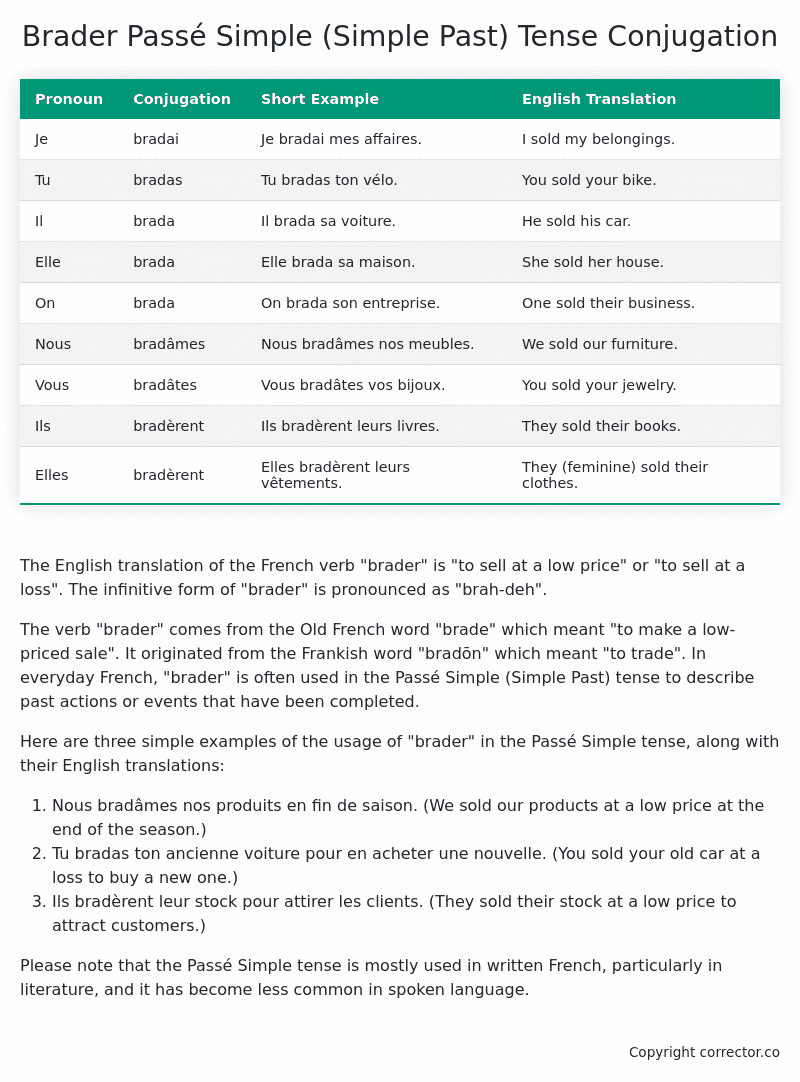Passé Simple (Simple Past) Tense Conjugation of the French Verb brader
Introduction to the verb brader
The English translation of the French verb “brader” is “to sell at a low price” or “to sell at a loss”. The infinitive form of “brader” is pronounced as “brah-deh”.
The verb “brader” comes from the Old French word “brade” which meant “to make a low-priced sale”. It originated from the Frankish word “bradōn” which meant “to trade”. In everyday French, “brader” is often used in the Passé Simple (Simple Past) tense to describe past actions or events that have been completed.
Here are three simple examples of the usage of “brader” in the Passé Simple tense, along with their English translations:
- Nous bradâmes nos produits en fin de saison.
(We sold our products at a low price at the end of the season.) - Tu bradas ton ancienne voiture pour en acheter une nouvelle.
(You sold your old car at a loss to buy a new one.) - Ils bradèrent leur stock pour attirer les clients.
(They sold their stock at a low price to attract customers.)
Please note that the Passé Simple tense is mostly used in written French, particularly in literature, and it has become less common in spoken language.
Table of the Passé Simple (Simple Past) Tense Conjugation of brader
| Pronoun | Conjugation | Short Example | English Translation |
|---|---|---|---|
| Je | bradai | Je bradai mes affaires. | I sold my belongings. |
| Tu | bradas | Tu bradas ton vélo. | You sold your bike. |
| Il | brada | Il brada sa voiture. | He sold his car. |
| Elle | brada | Elle brada sa maison. | She sold her house. |
| On | brada | On brada son entreprise. | One sold their business. |
| Nous | bradâmes | Nous bradâmes nos meubles. | We sold our furniture. |
| Vous | bradâtes | Vous bradâtes vos bijoux. | You sold your jewelry. |
| Ils | bradèrent | Ils bradèrent leurs livres. | They sold their books. |
| Elles | bradèrent | Elles bradèrent leurs vêtements. | They (feminine) sold their clothes. |
Other Conjugations for Brader.
Le Present (Present Tense) Conjugation of the French Verb brader
Imparfait (Imperfect) Tense Conjugation of the French Verb brader
Passé Simple (Simple Past) Tense Conjugation of the French Verb brader (You’re reading it right now!)
Passé Composé (Present Perfect) Tense Conjugation of the French Verb brader
Futur Simple (Simple Future) Tense Conjugation of the French Verb brader
Futur Proche (Near Future) Tense Conjugation of the French Verb brader
Plus-que-parfait (Pluperfect) Tense Conjugation of the French Verb brader
Passé Antérieur (Past Anterior) Tense Conjugation of the French Verb brader
Futur Antérieur (Future Anterior) Tense Conjugation of the French Verb brader
Subjonctif Présent (Subjunctive Present) Tense Conjugation of the French Verb brader
Subjonctif Passé (Subjunctive Past) Tense Conjugation of the French Verb brader
Subjonctif Imparfait (Subjunctive Imperfect) Tense Conjugation of the French Verb brader
Subjonctif Plus-que-parfait (Subjunctive Pluperfect) Tense Conjugation of the French Verb brader
Conditionnel Présent (Conditional Present) Tense Conjugation of the French Verb brader
Conditionnel Passé (Conditional Past) Tense Conjugation of the French Verb brader
Conditionnel Passé II (Conditional Past II) Tense Conjugation of the French Verb brader
L’impératif Présent (Imperative Present) Tense Conjugation of the French Verb brader
L’impératif Passé (Imperative Past) Tense Conjugation of the French Verb brader
L’infinitif Présent (Infinitive Present) Tense Conjugation of the French Verb brader
L’infinitif Passé (Infinitive Past) Tense Conjugation of the French Verb brader
Le Participe Présent (Present Participle) Tense Conjugation of the French Verb brader
Le Participe Passé (Past Participle) Tense Conjugation of the French Verb brader
Struggling with French verbs or the language in general? Why not use our free French Grammar Checker – no registration required!
Get a FREE Download Study Sheet of this Conjugation 🔥
Simply right click the image below, click “save image” and get your free reference for the brader Passé Simple tense conjugation!

Brader – About the French Passé Simple (Simple Past) Tense
Formation
Usage
Narration
Historical Context
Interactions with other tenses
Passé Composé
Imparfait
Conditional and Subjunctive
Summary
I hope you enjoyed this article on the verb brader. Still in a learning mood? Check out another TOTALLY random French verb conjugation!


